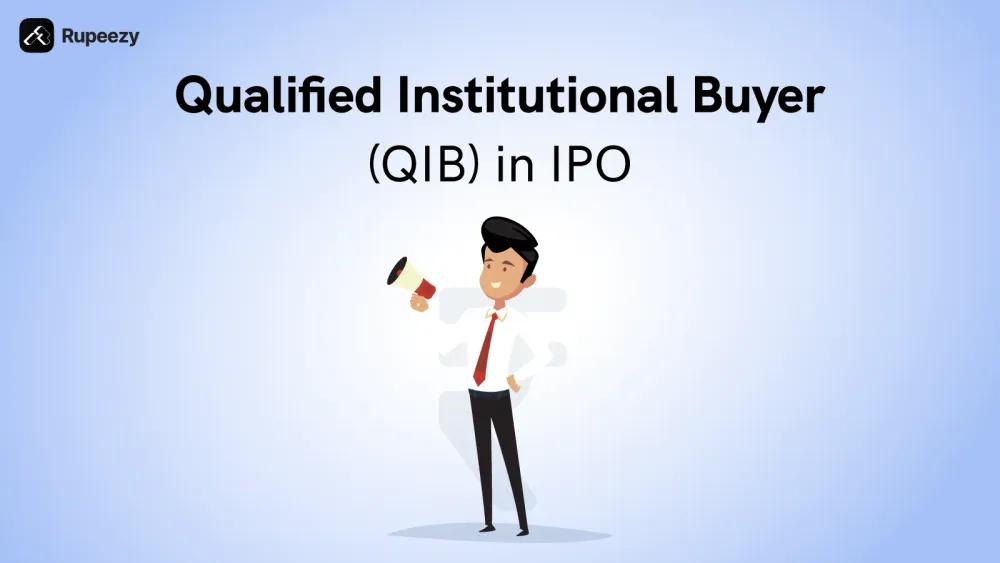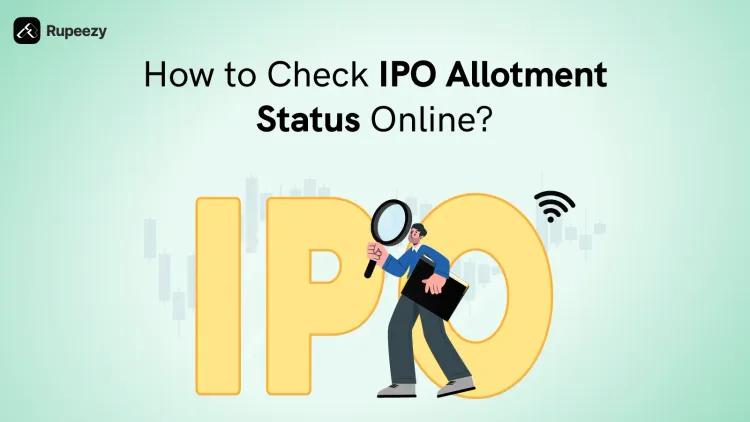Qualified Institutional Buyers: QIB in IPO Meaning & Example


00:00 / 00:00
A Qualified Institutional Buyer (QIB) is one of the most important players when it comes to IPOs. These are the large institutional entities that invest in the upcoming IPOs and help in building trust and credibility. These include mutual funds, banks, and insurance companies.
Generally, 50% of the total IPO shares are kept aside for the QIBs. When they invest in the IPO, they bring in good value of capital and trust for other retail investors.
In this blog, we’ll explain what QIB in IPO means, share examples of such entities, their roles, and the list of Qualified Institutional Buyers in India as per SEBI.
Who are Qualified Institutional Buyers (QIBs)?
QIB stands for Qualified Institutional Buyers. They are large institutional investors who offer you a good amount of investment and expertise. Some QIB examples include:
Mutual funds
Insurance companies
Pension funds
Banks
Foreign portfolio investors (FPIs)
Venture capital funds
All are registered with regulatory authorities like SEBI. Now the question is, what is QIB in IPO? So, it refers to a special category of investors who are allocated a reserved portion of shares. Their participation is crucial as they bring credibility, stability, and large capital inflows to the IPO process.
QIBs are considered sophisticated investors who can make informed decisions. They do not require the same level of disclosure as retail investors, but they are required to follow strict reporting and transparency standards.
List of Qualified Institutional Buyers in India
According to Regulation 2(1)(ss) of the SEBI (Issue of Capital and Disclosure Requirements) Regulations, 2018, a Qualified Institutional Buyer means:
Mutual funds, alternative investment funds, venture capital funds, and foreign venture capital investors registered with SEBI
Foreign portfolio investors (other than individuals, corporate bodies, and family offices)
Public financial institutions
Multilateral and bilateral development financial institutions
Scheduled commercial banks
State industrial development corporations
Insurance companies under the Insurance Regulatory and Development Authority of India (IRDAI)
Provident funds with Rs. 25 crore minimum corpus
Pension funds with Rs. 25 crore minimum corpus
National Investment Fund
Insurance funds managed by the army, navy, or air force of India
Insurance funds managed by the Department of Posts, India
Systemically important non-banking financial companies (NBFCs)
In short, these are key institutional investors with the financial strength and expertise to anchor IPOs and other capital market transactions, playing a vital role in market stability and investor confidence.
Role of QIBs in IPOs
Just like any other investor, Qualified Institutional Buyers also play a crucial role in the IPO process. Some key roles they play are as follows:
1. Anchor Investors
QIBs are allocated a substantial portion of shares in IPOs, often around 50%, which helps ensure that a large part of the issue is subscribed quickly. This early commitment by financially strong institutions boosts confidence among other investors and provides a solid foundation for the offering.
2. Market Stability and Liquidity
By investing significant capital, QIBs enhance market liquidity and reduce price volatility during and after the IPO. Their presence helps smooth the price discovery process and supports orderly trading post-listing.
3. Due Diligence and Expertise
QIBs are sophisticated investors with the expertise to conduct thorough due diligence before investing. Their informed participation acts as a quality check on the issuing company, indirectly protecting retail investors by signaling the IPO’s credibility.
4. Regulatory Compliance and Transparency
QIBs must meet stringent SEBI criteria, including minimum asset thresholds and registration requirements. They are subject to strict reporting and disclosure norms, ensuring transparency in their transactions and fostering trust in the market.
5. Efficient Capital Raising
The involvement of QIBs allows companies to raise large amounts of capital efficiently and often at a lower cost due to their market influence and reputation. This is crucial for companies aiming for rapid growth or expansion.
6. Signaling Effect
The participation of reputed QIBs acts as a positive signal to the market, attracting further investment from non-institutional and retail investors. This enhances overall demand and can improve the pricing and success rate of the IPO.
Benefits of Being a QIB Investor
It is known that there is a 50% QIB quota in IPOs. This is one of the benefits that QIB investors enjoy, but there are several other advantages they receive in the process. These include:
1. Access to Exclusive Offerings
QIBs can participate in private placements and Qualified Institutional Placements (QIPs), giving them access to high-quality investment opportunities not available to retail investors. This privileged access allows them to acquire large stakes in sought-after IPOs or private deals, often at favorable terms.
2. Priority in IPO Allotment
QIBs receive a reserved quota, typically 50%, in IPOs, ensuring they get substantial share allocations before retail investors. This early and preferential access can lead to better pricing and larger holdings, enhancing their investment returns and influence in the market.
3. Influence and Market Impact
Due to their large-scale investments, QIBs can significantly impact IPO pricing and market demand. Their participation lends credibility to the offering, attracting other investors and stabilizing demand, which helps companies raise capital efficiently and at better valuations.
4. Quick Settlement and Lower Costs
QIBs benefit from streamlined investment processes, especially in QIPs, which require less regulatory approval and can be completed within days. This reduces transaction costs, as there’s no need for extensive legal or audit teams, making capital raising faster and more cost-effective.
5. Liquidity and Flexible Exit
Unlike some other investor categories, QIBs are generally exempt from IPO lock-in periods, allowing them to sell their shares immediately after listing. This flexibility provides them with increased liquidity and the ability to respond quickly to market changes. However, the exemption doesn't apply to QIBs who are also designated as anchor investors, and typically face a lock-in period.
6. Better Information Access
QIBs often have access to more detailed financial data, projections, and company insights than retail investors. This superior information enables them to make more informed and strategic investment decisions, reducing risk and enhancing returns.
7. Regulatory Recognition and Reduced Oversight
Recognized and regulated by SEBI, QIBs operate with fewer restrictions compared to retail investors. Their expertise and financial strength mean they are trusted to assess risks independently, resulting in a more efficient investment environment.
8. Market Stability and Confidence
QIB participation brings stability and credibility to IPOs and capital markets. Their involvement reassures other investors, supports price stability, and increases the likelihood of a successful public offering.
Rules and Regulations for Qualified Institutional Buyers
SEBI has defined some rules and regulations that govern investment in the QIB. The important ones of them that you should know are as follows:
QIBs include institutional investors with a minimum corpus of Rs. 25 crore, venture capital funds, foreign portfolio investors (excluding individuals and family offices), and other registered financial institutions.
A QIB should be valid and registered with apex institutions like SEBI or IRDAI, based on its nature.
A minimum of 50% issue size is reserved for the QIBs in IPOs.
For IPOs up to Rs. 250 crore, at least two QIBs must be allotted shares; for IPOs above Rs. 250 crore, a minimum of five QIB allottees is required.
No single QIB can receive more than 50% of the QIB portion in an IPO, preventing concentration of shares.
QIBs cannot be promoters or related to promoters of the issuing company when subscribing through Qualified Institutional Placements (QIPs).
The total amount a company can raise via QIBs through QIPs in a financial year cannot exceed five times the issuer’s net worth at the end of the previous financial year.
Securities allotted to QIBs (called “specified securities”) must be fully paid at allotment and can be equity shares or convertible instruments (excluding warrants) convertible within six months.
Merchant bankers managing QIB placements must submit a due diligence certificate to the stock exchange, ensuring compliance with SEBI regulations; failure to do so invalidates the placement.
There should be a minimum of 6 months' gap between multiple placements of specified securities by the issuer.
After getting approval from the existing shareholders, an issuer can offer up to 5% discount to the QIB.
There should be complete transparency and disclosure. Everything linked to the investment needs to be shared properly to avoid any confusion.
Recent SEBI consultations propose expanding the definition of QIBs to include accredited investors for specific debt securities, broadening the investor base while maintaining quality.
There is no QIB minimum investment in IPO by SEBI.
QIB Quota in IPOs
The QIB quota in IPOs refers to the portion of shares reserved specifically for Qualified Institutional Buyers during an Initial Public Offering. As per SEBI regulations:
Up to 50% of the IPO issue size is reserved for QIBs in book-built IPOs. However, if a company does not meet these profitability criteria, SEBI mandates that at least 75% of the net offer must be reserved for Qualified Institutional Buyers (QIBs)
Within the QIB quota, up to 60% can be allocated to anchor investors, who are a sub-category of QIBs and invest before the IPO opens to the public.
For IPOs up to Rs. 250 crore, at least 2 QIB allottees are required; for issues above Rs. 250 crore, there must be a minimum of 5 QIB allottees.
No single QIB can receive more than 50% of the QIB portion in an IPO.
5% of the QIB quota is reserved for mutual funds; if demand from mutual funds is less, the remaining shares are allocated to other QIBs on a proportionate basis.
Allotment to QIBs is done on a proportionate basis in case of oversubscription.
There is no lock-in period for QIB shares, allowing QIBs to sell their allotted shares as soon as trading begins.
Non-anchor Qualified Institutional Buyers (QIBs) typically do not have a lock-in period. However, shares allotted to anchor investors are subject to a lock-in. Specifically, 50% of their shares are locked in for 90 days, while the remaining 50% are locked in for 30 days from the date of allotment.
How to Become a QIB Investor in India
To become a QIB investor in India, an entity must meet specific eligibility and regulatory requirements set by SEBI:
The entity must fall under SEBI’s defined categories, such as mutual funds, venture capital funds, alternative investment funds, foreign venture capital investors registered with SEBI, scheduled commercial banks, insurance companies registered with IRDAI, provident and pension funds with a minimum corpus of Rs. 25 crore, and systemically important NBFCs.
The entity must be registered with the appropriate regulatory authority (e.g., SEBI for mutual funds and venture funds, IRDAI for insurance companies).
It must possess substantial financial resources and market expertise, as QIBs are expected to have significant assets under management and the ability to make informed investment decisions.
For provident and pension funds, a minimum corpus of Rs. 25 crore is mandatory to qualify as a QIB.
The entity must comply with all relevant SEBI regulations, including strict reporting, disclosure, and transparency standards.
Once qualified, these institutions can participate in IPOs, QIPs, and other large-scale capital market transactions reserved for QIBs.
How to Apply as a QIB in an IPO
To apply as a QIB in an IPO, the process is structured and governed by SEBI regulations. Here are the key steps:
Ensure Eligibility: The entity must be registered as a Qualified Institutional Buyer (QIB) with SEBI or another relevant authority. Eligible QIBs include mutual funds, insurance companies, scheduled commercial banks, pension and provident funds with a minimum corpus of Rs. 25 crore, venture capital funds, and foreign portfolio investors (excluding individuals and family offices).
Documentation: Prepare and submit required documents such as financial statements, proof of SEBI registration, and any other regulatory compliance documents.
Application Submission: QIBs apply for IPO shares through the book-building process, submitting bids via the designated stock exchange platform. They must specify the quantity and price (within the price band) but cannot apply at the cut-off price.
No Minimum Investment (except Anchor Investors): There is no specific minimum investment for QIBs in the general QIB category. However, for anchor investors (a subcategory of QIBs), the minimum application size is Rs. 10 crore in Mainboard IPOs and Rs. 2 crore in SME IPOs.
Allotment Process: Shares are allotted to QIBs on a proportionate basis if the IPO is oversubscribed. No single QIB can receive more than 50% of the QIB quota. At least 50% of the IPO issue size is reserved for QIBs, with 5% specifically for mutual funds.
No Withdrawal: Once a QIB applies, withdrawal of the application is not permitted after the IPO closes.
Allotment and Listing: After allotment, QIBs receive their shares in demat form. There is no lock-in period for QIBs, so they can sell the shares as soon as trading begins.
This process ensures that only financially strong and regulated institutions participate as QIBs, providing stability and credibility to the IPO.
Conclusion
QIBs are essential to the success and credibility of any IPO in India. Their financial strength, regulatory backing, and early participation not only support capital raising but also influence retail and non-institutional investor confidence.
With 50% of the IPO reserved for them, QIBs serve as the foundation of a well-subscribed public issue. If you are looking to understand IPO dynamics better, knowing the role and rules around QIBs is a great place to start.
FAQs
Q1. What is the QIB full form in IPO?
QIB stands for Qualified Institutional Buyer. These are large financial institutions like mutual funds, banks, and insurance companies that are allowed to invest in IPOs under SEBI regulations.
Q2. Is there any lock-in period for QIB investors in IPOs?
No, there is no lock-in period for QIBs after allotment. They can sell their shares on the stock exchange as soon as trading begins.
Q3. Can QIBs bid at the cut-off price in IPOs?
No, QIBs cannot bid at the cut-off price. Unlike retail investors, they must place a bid within the price band and specify the exact price and quantity.
Q4. Who is eligible for QIB?
Entities such as mutual funds, insurance companies, banks, and pension or provident funds with a minimum Rs 25 crore corpus are eligible to become QIBs. They must be registered with SEBI or relevant regulatory authorities and have strong financial capability.
Q5. What is the minimum investment required for QIBs in an IPO?
There is no minimum investment requirement for QIBs in IPOs, except for anchor investors. Anchor investors, a subcategory of QIBs, must invest at least Rs. 10 crore in Mainboard IPOs and Rs. 2 crore in SME IPOs.
Check Out These Related Articles |
The content on this blog is for educational purposes only and should not be considered investment advice. While we strive for accuracy, some information may contain errors or delays in updates.
Mentions of stocks or investment products are solely for informational purposes and do not constitute recommendations. Investors should conduct their own research before making any decisions.
Investing in financial markets are subject to market risks, and past performance does not guarantee future results. It is advisable to consult a qualified financial professional, review official documents, and verify information independently before making investment decisions.

All Category







